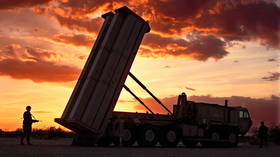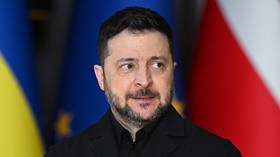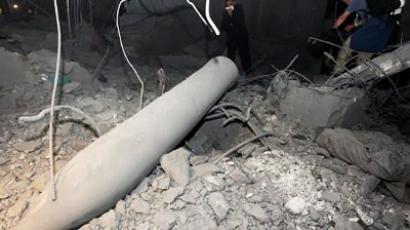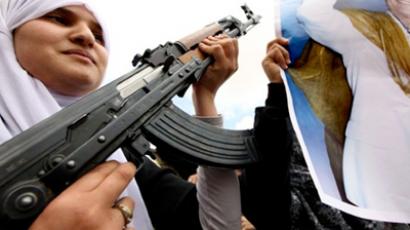Financing rebels will increase casualty numbers – journalist

As NATO pushes for financing the rebels in Libya, claiming it will help protect civilians in the country, Charles Glass, author and journalist believes it is unfair to finance only one side in the conflict.
“One has to remember that money belongs to the Libyan people, and there’s a civil war going on in Libya, and it may not be fair to distribute that money to one side or the other in a civil war. It might be better to preserve that money, so when the war is over, and the country needs to be rebuilt, it can go to benefit all of the people and not just some of them,” Glass added.On May 4 NATO Secretary-General Andres Fogh Rasmussen stated increasing the financial backing provided for the rebels in Libya could be one of the ways to step up pressure on Gaddafi. According to Charles Glass, financing the rebels will actually escalate the conflict, raising the stakes and increasing the number of casualties. “Military forces are a very blunt instrument – you can’t guarantee what will happen, but based on the history of every war you can probably predict a lot more people will be killed as weapons get improved,” he says. “The aim of the Libyan conflict should be its ending and trying to find a way to get Gaddafi out of power and allowing the Libyan people to choose their own leader. But that does not seem to be what the policy is, they are calling for regime change.”And though it is hard to predict what will happen to Gaddafi, Charles Glass is sure the Libyan leader will not go of his own accord.“It’s not entirely up to him whether he is killed the way Osama Bin Laden was just killed, he can’t know whether he will end up in the criminal court or not. He could negotiate his way out now, but he seems to be the kind of leader who will not go voluntarily, he will cling to power to the very end.”
Meanwhile, John Laughland, from the Institute for Democracy and Co-operation in Paris, does not think that anyone seriously believes funding the rebels is intended to protect the civilians or impose a new “no fly-zone”, but rather to overthrow the Gaddafi regime.“We all know that the hostilities against Libya have been started within the context of the Arab revolutions,” says Laughland, ” in other words the bombings have been launched in order to make the same thing happen in Libya as it happened in Tunisia or Egypt. In other words, the goal of these bombing campaigns is quite clearly the regime change. Let’s not forget that the British Minister of Defense said exactly that in the very first days, I think, after the bombings started. He said Colonel Gaddafi himself was a legitimate target.”“The denials that this is not the case, the denial that Gaddafi is not a target is not true, it’s a lie. I don’t think anyone believes it,” he said. “I think that Russia and China, certainly Russia, are very sorry that they did not veto the original resolution six weeks ago which authorized a no-fly zone in the protection of civilians,” continues Laughland. “The problem with these resolutions is that once you let loose the dogs of war, it’s very difficult to stop them. What I mean is that it’s very difficult to prevent the countries that are really fighting this war – France, Britain and America – from sticking to anything that takes us back to regime change and [the] assassination of Gaddafi,” he concluded.
The anti-war activist David Wilson says NATO’s actions in Libya, which he suspects includes using weapons of mass destruction, do not look like actions aimed to defend civilians. “The only people who should be in criminal courts at the moment are actually the NATO leaders who seem to be very probably using weapons of mass destruction…and I am referring to the possible use of the depleted uranium now in Libya,” he said. “If they are defending civilians, why are they possibly using weapons which cause cancers, leukemia, pregnancy defaults for women? That does not seem like a very good way to protect civilians.”
Professor Alan Kuperman, an expert on US military intervention, believes the war in Libya would have ended more than a month ago if not for the intervention. The rebels simply would have been defeated, the killing would have stopped, and more people would be alive today. “The intervention that is intended to end the violence sometimes escalates the violence and that’s exactly what is happening in Libya – and Gaddafi is secure in Tripoli. His forces are loyal and large parts of the country support him. So, a little bit of intervention is not going to compel him to step down,” believes Kuperman.“The removal of Gaddafi is not the right thing to do – it’s not legal. It’s not authorized by the UN authorization – it would be assassination. It does seem as if NATO is doing this. I don’t believe they should do it. Not only is it illegal and violates norms, but it results in the tragic deaths of innocent civilians,” he says. “If one of the shots got lucky and killed him, would that end the fight? I tend to think not. That would not be changed with the killing of one man. I think the ultimate solution for Libya is going to be a peace agreement,” Kuperman concludes.














